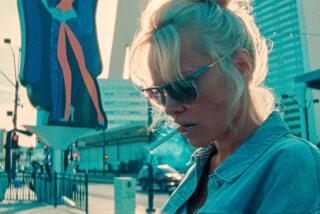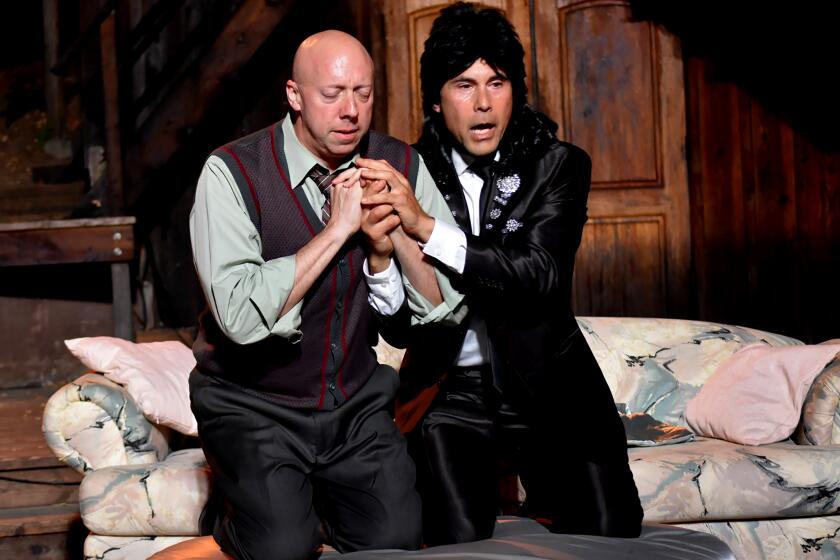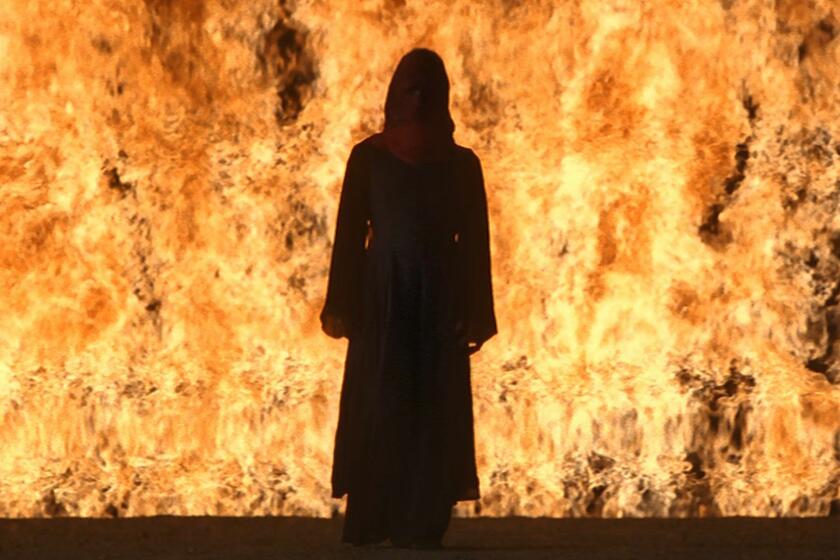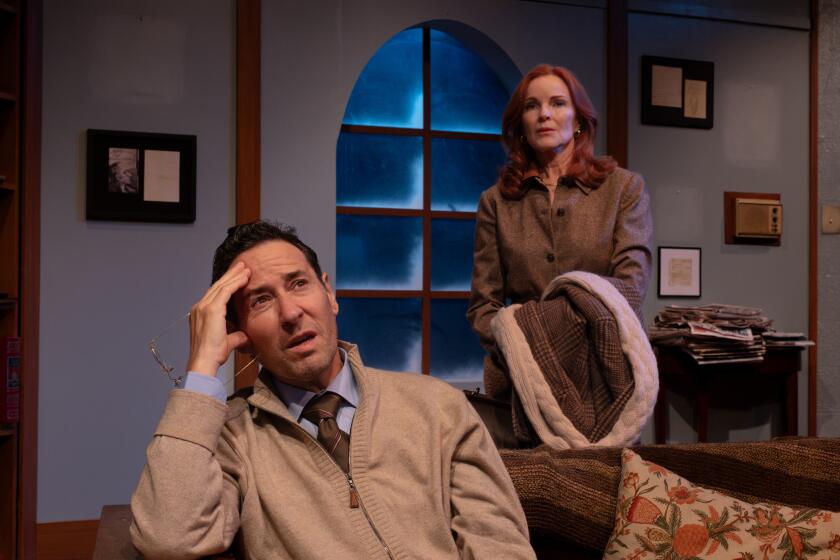San Diego, Our Calendar Is Wide Open
When a proposal was made that the San Diego Opera display Super Bowl score updates in the lobby during intermissions of last Sunday’s matinee, the company’s director, Ian Campbell, who is Australian, understood the request, even though he added, “I’m not particularly excited by pituitary cases chasing a pig’s bladder.”
Professional football--the Super Bowl first and foremost--is the pig’s bladder du jour in San Diego, which has a commitment to be the host city for Super Bowl XXXII on Jan. 25, 1998, but could lose the game to the always accommodating Pasadena (home of the Rose Bowl) or even to that trendy northern Southland suburb of Los Angeles (home of the Coliseum).
I say, let’s grab it.
As long as San Diegans quibble over money and dawdle over an event that in 1988 enriched their economy by an amount that the city’s mayor, Susan Golding, estimates to be $200 million, I say, let’s take this Super Bowl off their hands . . . and, to paraphrase the Wicked Witch warning Dorothy on the way to Oz, that goes for your little Chargers too.
Thou shalt not steal nor covet thy neighbor’s spouse, but no commandment says anything about the NFL, unless I missed any recent amendments. Let us not wait for springtime for San Diego’s electors and electees to get with the program. I make a motion we go knock on the door of NFL Commissioner Paul Tagliabue, who lives, I believe, on Avenue of the Czars, and urge him to give us Super Bowl XXXII, posthaste.
(I love that political lingo.)
San Diego should be done thinking by now. You don’t plan Super Bowls months in advance; this is something you plan for years, like the Vatican restoring the Sistine Chapel, or like Madonna having a baby. You don’t start remodeling your football stadium for a Super Bowl, then argue over who will foot the bill.
For fans of the Packers and Patriots who attended last week’s game, you Cheeseheads and you Chowderheads, your entire focus should be on recovering from your New Orleans gluttony in time for next year’s rematch at Jack Murphy Stadium, with its new capacity of 72,000 seats. Why, for all we know, Super Bowl XXXII could pit Mike Ditka’s Saints versus Kevin Gilbride’s Chargers, even though New Orleans and San Diego are virtually guaranteed most years (with those teams) to be neutral sites.
Instead, San Diego keeps dickering around.
Restoration of the Murph is in limbo. The city’s financial agreement with the Chargers is being challenged. The baseball Padres have moved their offices out of the ballpark. Construction delays could interfere with the Charger season, the Super Bowl, or both. Should the city’s expansion contract be breached, the Chargers will be eligible to leave town after 2003, for L.A. or anywhere else. And they might need a temporary site in 1997.
That means Los Angeles. We give great Temporary Site.
On the ball, Dave Jacobs, manager of the Rose Bowl stadium, got right on the horn to Dean Spanos, president of the Chargers. Jacobs said, “We let them know we would be more than happy to be of assistance to them, any way we can.”
Atta way, Dave. Go get ‘em, pal.
After all, if the Raiders can go from Oakland to Los Angeles to Oakland, I see no reason the Chargers can’t go from L.A. to San Diego to L.A. (We would even throw back the Clippers, free of charge.)
As regular readers know, I believe L.A. should heist a team from another NFL city, because I do not believe we will be given an expansion franchise at any time during the Clinton, Gore, Perot or Powell presidential administrations. The moral imperative aside, all is fair in love, war and pituitary cases chasing a pig’s bladder.
To remain in the Super Bowl rotation, until we can get a team, the Rose Bowl and Coliseum must leech onto previously selected sites that fail to meet the NFL’s needs. Arizonans once voted that on Martin Luther King’s birthday, they would conduct business as usual. The NFL said fine, have a nice day, we will take our business elsewhere.
It’s not nice to fool Mother Nature or Mother NFL. When you tell the NFL to take something (such as the Coliseum) or leave it, it is your privilege. But the NFL has the right to leave it.
Protesters oppose a financial agreement with the Chargers that guarantees a minimum of 60,000 tickets sold for every game--the city will reduce the rent otherwise--and ensures the Chargers’ staying in town through 2020. Mayor Golding found this plan infinitely better than providing the team with “free rent,” as some NFL cities do.
However, an agreed-upon $60-million stadium expansion rose to $78 million, thanks to opponents who delayed the project by dragging the city to court. Now the extra $18 million is on hold. A judge has set Feb. 20 for a trial to decide whether a possible public vote should deal with the entire $78-million project or only the extra $18 million.
Can the NFL wait until spring?
And suppose San Diego votes no?
I say, Pasadena or L.A. should get the Super Bowl, right now, today. We have a 100,000-seat stadium and no team. San Diego has a team and a stadium that currently holds 60,000. Commissioner, you can have a Super Bowl without a team. You can’t have a Super Bowl without a bowl.
* STADIUM TROUBLE
San Diego could lose next year’s Super Bowl because of a snag in expansion plans. A1
(BEGIN TEXT OF INFOBOX / INFOGRAPHIC)
San Diego Snags
* Oct. 27, 1993: NFL names San Diego Jack Murphy Stadium site of 1998 Super Bowl.
* March 1995: Chargers and the city sign $60-million deal to expand the stadium.
* Dec. 10, 1996: San Diego City Council approves an $18-million addendum to expansion project, triggering a referendum drive by expansion opponents. Issue will be voted on this spring.
* Dec. 31, 1996: Around-the-clock construction begins at the stadium.
* Feb. 20, 1997: Trial date to decide whether a possible public vote should deal with the entire $78 million or only the $18 million. If the $78 million is the figure, construction will stop immediately and the Super Bowl probably will be moved, perhaps to Pasadena or Los Angeles.
More to Read
The biggest entertainment stories
Get our big stories about Hollywood, film, television, music, arts, culture and more right in your inbox as soon as they publish.
You may occasionally receive promotional content from the Los Angeles Times.






